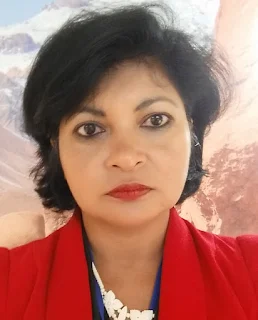UNESCO’s Finance Commission has unanimously
supported the call to challenge the development categorisation of countries
according to Gross Domestic Product (GDP) tabled by Trinidad and Tobago’s
representative to the UNESCO Executive Board, Dr Kris Rampersad with colleagues from the Caribbean and other Small Island Developing States and supporters from other countries.
We are advocating revision
of the GDP basis for economic categorisation of States into small, medium and
large categories promoted by global financial organisations like the World Bank as it does not reflect the tremendous disparities in income, levels of
poverty and inequalities within countries. It is part of a draft resolution proposed
by Caribbean representatives and global SIDS with support from others for
UNESCO to develop a focussed strategy of programme implementation and means of financing
and resourcing an action plan for SIDS.
It requests that UNESCO’s Institute
of Statistics collate the relevant data for phased presentation to the
Executive Board, “taking account of the
vulnerabilities linked to limitations of size and resources economies of scale,
indebtedness, external economic shocks and natural hazard occurrences and
resources.” Support for the resolution ha already come from not only Small Island Developing
States (SIDS) of the Atlantic, Pacific and Indian Oceans but also ‘developed’ island
states as the UK as well as countries like the United States, Sweden, and China
who recognised the place of SIDS in achieving the United Nations’ Sustainable Development
Goals and to ‘the future of the planet.’
UNESCO’s Finance Commission (FA) is charged with examining budgetary provisions of the organisation. It is one of two commissions, with the Programme and External Relations Commission (PX), which is chaired by the representative of Mexico with co-chair, the Trinidad and Tobago Representative.
The resolution has implications for not
only on SIDS but all of the developing world, Unless these misrepresentations
are addressed we are likely to face the same pitfalls in meeting the United
Nation’s new Sustainable Development Goals (SDGs) as with the Millennium
Development Goals (MDGs), Persistent
poverty and other glossed-over internal challenges have hampered achievement of
the Millennium Goals. The GDP classifications have also restricted
access to technical and other resources by civil society and others working to
redress the imbalances at poverty, gender disparity and other inequalities at ground
level.
Dr Kris Rampersad is an independent development educator/consultant who has been promoting culture-centred approaches to development as the UNESCO-trained heritage facilitator for the Caribbean and Trinidad and Tobago’s Representative to the Executive Board, 2013-2017. Trinidad and Tobago became a member of the UNESCO Executive Board with the highest number of votes among the Group of Latin American and Developing Countries (GRULAC) at UNESCO elections of 2013. New members will be admitted to the 58-member Executive Board following elections carded for the upcoming UNESCO General Conference in November 2015, where all Executive Board resolutions will be finalised and adopted.
@krisramp @KrisRampersadTT @lolleaves @glocalpot #Demokrissy #Glocalknowledgepot #LeavesofLife #LeavesOfLive #CaribbeanLiterarySalon
Related Links:
http://kris-rampersad.blogspot.fr/2015/10/unesco-asked-to-help-review-economic.html



No comments:
Post a Comment
B4 U Say It: Is It True? Is It Kind? Is It Necessary? Rights reserved to delete inappropriate and offensive comments or solicitations.